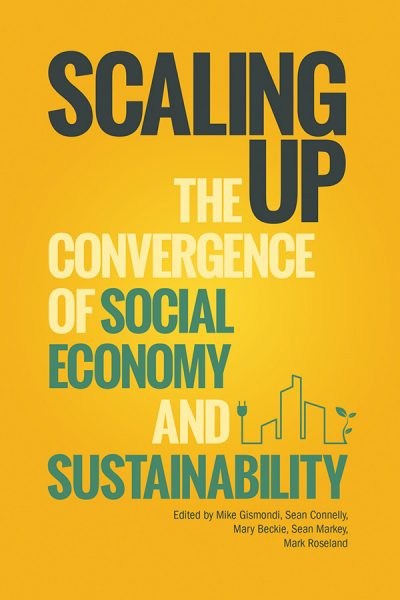Public Deliberation on Climate Change Lessons from Alberta Climate Dialogue
edited by Lorelei L. Hanson

Subjects: Business and Economics, Environmental Studies, Sociology
Imprint: AU Press
When citizens take collaborative action to meet the needs of their community, they are participating in the social economy. Co-operatives, community-based social services, local non-profit organizations, and charitable foundations are all examples of social economies that emphasize mutual benefit rather than the accumulation of profit. While such groups often participate in market-based activities to achieve their goals, they also pose an alternative to the capitalist market economy. Contributors to Scaling Up investigated innovative social economies in British Columbia and Alberta and discovered that achieving a social good through collective, grassroots enterprise resulted in a sustainable way of satisfying human needs that was also, by extension, environmentally responsible. As these case studies illustrate, organizations that are capable of harnessing the power of a social economy generally demonstrate a commitment to three outcomes: greater social justice, financial self-sufficiency, and environmental sustainability. Within the matrix of these three allied principles lie new strategic directions for the politics of sustainability.
Whether they were examining attainable and affordable housing initiatives, co-operative approaches to the provision of social services, local credit unions, farmers’ markets, or community-owned power companies, the contributors found social economies providing solutions based on reciprocity and an understanding of how parts function within the whole—an understanding that is essential to sustainability. In these locally defined and controlled, democratically operated organizations we see possibilities for a more human economy that is capable of transforming the very social and technical systems that make our current way of life unsustainable.
Contributors: Mary Beckie, Randy Bell, Marena Brinkhurst, Kailey Cannon, Sean Connelly, Mike Gismondi, Lillian Hunt, Noel Keough, Freya Kristensen, Celia Lee, Mike Lewis, Julie L. MacArthur, Terri MacDonald, Sean Markey, Juanita Marois, George Penhold, Stewart Perry, John Restakis, Lauren Rethoret, Mark Roseland, Lynda Ross, Erin Swift-Leppakumpu, and Kelly Vodden.
Flowing from a unique and dynamic Practitioner–Academic partnership, Scaling Up presents fresh theoretical formulations and compelling cases that demonstrate how the social, economic, and ecologic are being innovatively woven together. Useful to practitioners, researchers, and policy makers alike, this book will encourage collaboration and communication between those focused on an ecologically sustainable future and those interested in reinserting social goals into our economic calculus.
Michael Lewis, co-author of The Resilience Imperative: Co-Operative Transitions to a Steady State Economy
An innovative and refreshing book coming at a time when society is seeking a new way of organizing the economy that brings about greater social justice.
Gavin Friddell, Canada Research Chair in International Development Studies
A great read for researchers, practitioners, and policymakers interested in how the social economy is transforming communities today, and what opportunities this holds for the future. The examples detailed in this book demonstrate that the social economy can serve to reinforce the notion that sustainability is a process and not a fixed outcome.
Community Development Journal
This work is licensed under a Creative Commons License (CC BY-NC-ND 4.0). It may be reproduced for non-commercial purposes, provided that the original author is credited.